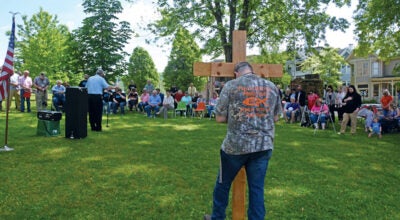Speaker to discuss Burlington’s role in Underground Railroad
Published 9:20 am Monday, March 18, 2013
Event set for 6 p.m. March 25
BURLINGTON — In the dead of night, black men, women and children were quietly ushered from one station to the next by those brave enough to take on the roles of conductors on the Underground Railroad.
Big names, such as Harriet Tubman, saturate the history books, but there were citizens of Lawrence County who did their part in helping people to freedom as well.
Chris Saunders, self-proclaimed history geek, seeks to inform the community of the role Lawrence County, especially Burlington, played during this time in American history. He will speak at an event hosted by History Alive, a local group dedicated to sharing history with the area, March 25 from 6 to 7:30 p.m. at Burlington Baptist Church.
“I’ve been researching Lawrence County history for about 15 years as a hobby, with an emphasis on the Underground Railroad for about the last four or five years,” Saunders said. “Burlington was the first county seat of Lawrence County and that’s where everything was going on at the time. A lot of the early movers and shakers in Lawrence County were abolitionists and Underground Railroad conductors. John Campbell, the founder of Ironton, was one of them.”
Saunders said studying history is a painstaking process, but once he started, he could not stop wanting to learn more. He said what he finds especially interesting is how Burlington seemed to shirk the state’s Black Laws.
“After Ohio was founded, the state enacted a series of Black Laws,” Saunders said. “The basic premise was you can be here and you can be free, but we’d rather not have you settle here. The laws were designed to keep blacks moving north. What I have found, and is becoming more and more apparent to me, is in early Lawrence County and Burlington, the state Black Laws weren’t really enforced. We have evidence of blacks buying land, which was odd for the time. Even more odd was blacks buying land downtown right next to their white neighbors. Bigger cities, such as Cincinnati, had race riots, but Burlington didn’t have anything like that.”
Saunders said even though Burlington was more tolerant than other places, it still was no utopia. He said black families were charged more to send their children to school among other disparities they faced.
As a whole however, he said Burlington was very progressive. At least six Underground Railroad conductors lived near the courthouse, Saunders said. This was of course risky considering what they were doing was very illegal, he said.
“By legal definition, Underground Railroad conductors were thieves,” Saunders said. “Slaves were property, so by taking them away from their owners they were stealing. At the time, by law and society they were criminals, but today we call them heroes. It goes to show there really can be honor amongst thieves.”
The main reason he shares his research with the public is because he does not want the people who risked life and freedom to be forgotten, Saunders said. He said there is a lot of history in Lawrence County and too many people do not realize many buildings or vacant lots they pass were once locations of key moments in history.
He said too often people in Lawrence County think they come from nowhere, but they could not be more wrong.
So he seeks to educate the public by whatever means possible, he said. Which is why he will speak at the Burlington event, which is free and open to all who wish to attend.
Those seeking more information can contact Steve Call, co-founder of History Alive, at (740) 550-9540 or thetravelprofessor@gmail.com.





